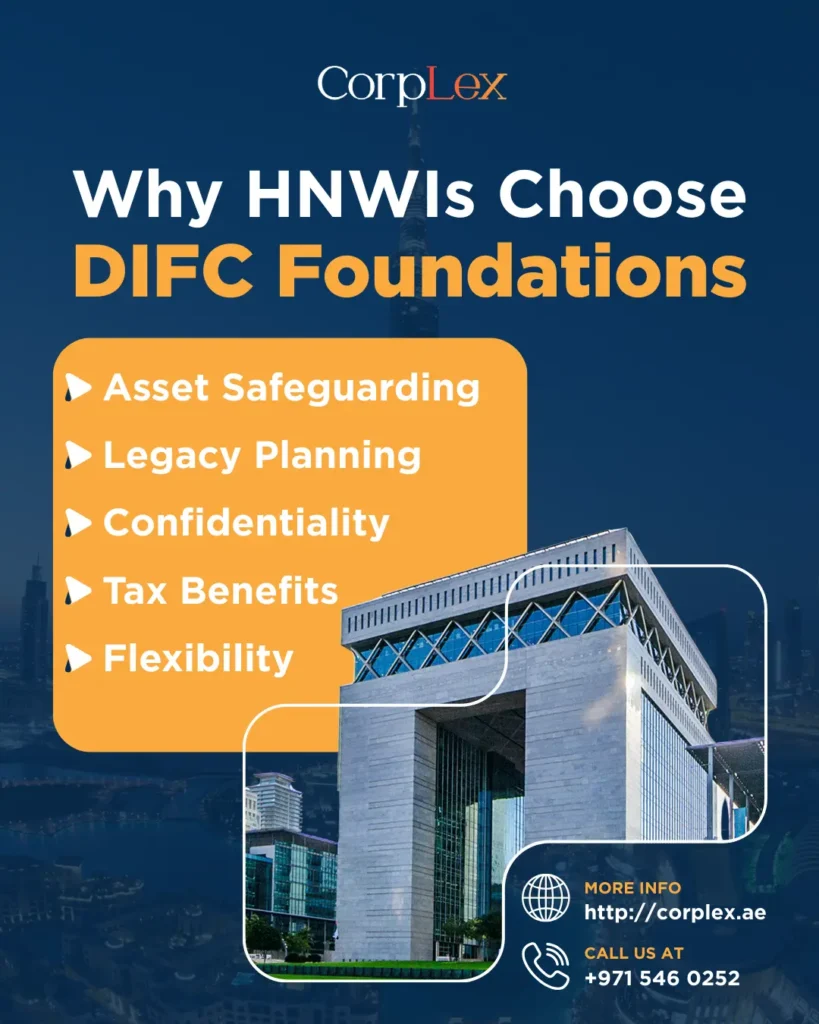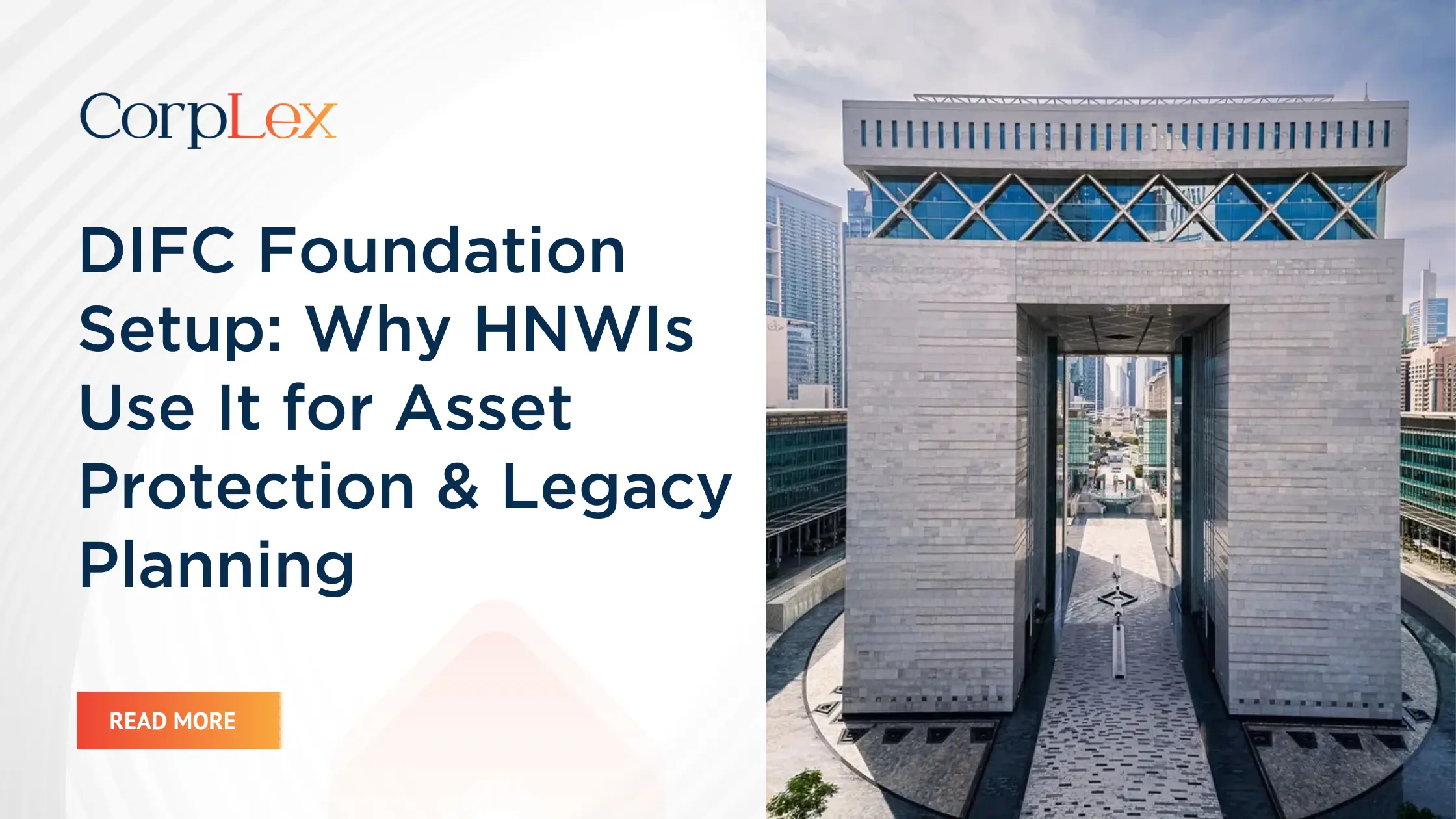Over the past few years, Dubai International Financial Center (DIFC), apart from being among the pioneers in world’s financing networks, it has also been a prime structure for the establishing of private wealth sectors in the middle east area.
One of the most multitalented structures is the DIFC foundations. Such a foundation is a legal entity designed to hold assets, secure wealth, and manage family successions in a safe and internationally esteemed framework.
DIFC structures have evolved into being the top picked choice for high net-worth individuals and businesses seeking an advanced, credible, and flexible solution. Understanding the utility of DIFC Foundations for asset securing and legacy planning.
If you’re also exploring business setup options in the DIFC, check out our detailed guide on DIFC Company Formation here
DIFC Foundation: Structures and Framework
“A Foundation is a body corporate with a legal personality separate from that of its Founder(s) and any other person.”/ Article 10 of the DIFC Foundations law No.3 of 2018/
- Special Features
- Legal Personality: The foundation has a separate legal personality and can hold assets under its name.
- Shareholder’s Absence: a foundation does not have owners, instead, this entity is looked after by a council and can appoint a guardian to ensure compliance with its objectives.
- Ongoing Existence: foundations often continue functioning indefinitely unless dissolved.
Comparison with Trusts and Holding Companies:
Trust is a legal relationship, initiated between the trustee, assets, and the beneficiary, a trust lacks legal personality; whereas, a foundation has a separate legal personality, this often offers advanced levels of security and builds for stable grounds.
As for holding companies, a foundation offers enhanced asset protection and privacy without shareholder obligations.
Why Do HNWI (High Net-worth Individuals) Use DIFC Foundations?

- Asset Safeguarding:Assets held by DIFC foundations are securely kept from creditors, political issues, and any external demands, ensuring their protection for long periods of time, especially for succession purposes, as any claim against the family won’t be with any legal force against a distinctive legal entity.
- Legacy Planning and Succession:The foundation’s legal structure authorizes founders to prop clear rules for inheritance, such clear planning allows for effortless transitions of control over businesses, investments, or property.
- Privacy and Consultancy:The details of beneficiaries and organizational framework are confidential, unlike public companies.
- Tax Privileges:Some foundations might enjoy tax benefits or could even be exempt depending on the scope of activities and purpose of establishment.
- Versatility:There is a choice for the charter to be customized to align with family, business, or holding purposes, this creates an access to multi-generational adaptability.
DIFC Foundations in Respect to Other Jurisdictions:
High net-worth individuals in the middle east region often prefer DIFC’s robust regulatory framework over traditional offshore jurisdictions; this could be justified due to the following:
- Precision and in some cases following Islamic succession laws.
- A prestigious, English common law-based legal system.
- Advanced regulatory framework with esteemed global compliance standards, this is crucial since offshore jurisdictions have had their blemished past with international regulations.
- The DIFC’s independent legal and commercial system creates a secure and powerful courts’ enforcement of provisions.
Step-by-step Process to Set Up a DIFC Foundation:
- Set clear objectives: Asset protection, succession planning, or the intention of gifting large amounts of money for a good cause.
- Appoint a registered agent with DIFC: often a corporate service provider licensed from DIFC.
- Draft the by-laws and charter: according to article 19 of the DIFC Foundation’s law of 2018, “a charter should contain the name of the foundation, the object of establishing, description of the initial capital, the duration if it is meant for a specific period of time, a declaration of the founders to ensure compliance with the contents of the charter”.
As for the by-laws, according to the 20th article of the same mentioned law, should “prescribe the functions of the Council, detail the procedures for the appointment, resignation and removal of members of the Council and any Guardian; remuneration of any members of the council or the guardian; specify the mechanism of decision making, and the fate of properties in case the foundation is deemed to be dissolved or no longer competent.”
- Appointment of the Council and Guardian:This would help in overseeing the foundation’s activities and protecting its’ cause.
- Portal registration:this step requires submitting the documents in question into the DIFC portal and paying the registration fee.
- Transfer of Ownership:As this is the final step, it requires the transferring of targeted assets into the foundation.
Frequently Used Purposes of Foundations:
- Family Wealth Structuring:the act of combining and safeguarding multi-generational wealth.
- Family Business Successions: foundations ensure a smooth transition of ownership without probate.
- Holding Purposes: foundations also offer centralized ownership of global investments, and real estate holding within a protected legal basis.
- Charity Purposes: this involves the supervision and conservation of charitable donations and projects, in the long-term.
Final Thoughts:
In conclusion, the intricate nature of DIFC Foundation regimes, and structural choices, promote the need for an experienced advisor’s insight and assistance. If properly done, such a foundation could serve as a secure, enduring, and flexible platform for preserving generational wealth. Therefore, it is an ideal option for high net-worth individuals in need of wealth protection as well as looking after family legacies.
Ready to secure your wealth and plan your legacy with DIFC Foundations? Contact our experts today to set up a compliant, tailored structure for your family or business.
-
Can a DIFC foundation own intellectual property rights?
Intellectual property rights such as trademarks or patents can be offered by such foundations through internet protocol (IP) holding and licensing benefits.
-
Can the registrar at DIFC refuse the foundation’s name for name similarity causes?
Yes, DIFC has strict naming rules and names are always checked for availability and potential conflicts that could extend beyond local bases.
-
Does setting up a DIFC foundation grant tax residency benefits?
No, since a foundation on its own is not a tax resident individual or entity, separate criteria apply for individuals and corporates when it comes to tax.
-
Is it possible to set up a foundation while keeping confidentiality of the founder?
Yes and no, since DIFC grants confidentiality rights; however, certain authorities and regulators will still have access to the information.

